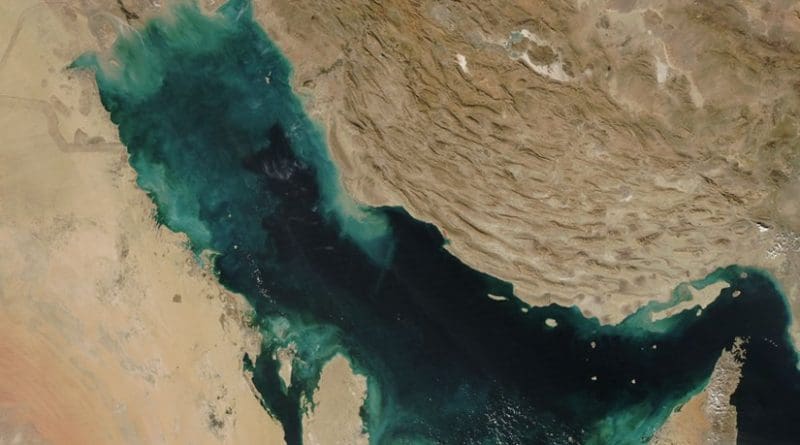US To Flex Naval Might In Persian Gulf War Games
By RT
The US Navy is leading its largest-ever war games in the Persian Gulf, with warships from 25 countries being deployed in the region. Tehran, in return, is preparing for its biggest air defense war game in the history of Islamic Republic next month.
The countries that deployed the largest number of warships for the 12-day training mission are the US, Britain, France, Saudi Arabia and the UAE.
The exact number of aircraft carriers, battleships and submarines taking part is unclear. Three American aircraft carriers out of the four currently in commission are reportedly gathering in the Persian Gulf for the training. USS Enterprise, USS John C. Stennis, USS Dwight D. Eisenhower have reportedly arrived.
The USS George Washington is believed to be on patrol in the Pacific Ocean but its exact whereabouts are a mystery. It was sighted near the island of Guam one week ago, and the air carrier’s Facebook page claims that it is still in the Pacific. But since the ship can travel at over 30 knots, it could be on its way to the Persian Gulf.
The aircraft carriers are supported by at least a dozen warships: Ballistic missile cruisers, destroyers, frigates and assault ships carrying thousand of US Marines and spec ops ships.
Britain dispatched six vessels to the Persian Gulf war games: the HMS Diamond, a brand-new £1 billion worth destroyer, four minesweepers and a logistics vessel.
The joint fleet is expected to simulate destroying Iranian fighter jets, battleships and coastal military defenses like missile batteries.
Attacking Iran cuts both ways for US
Tensions between Iran and Israel over Tehran’s controversial nuclear program have been on the uptick. Iran has blamed the US for Israel’s possible attack on Iran’s nuclear facilities, and promised to retaliate against American interests in the event of such an attack.
On Sunday, Iranian General Mohammad Ali Jafari confirmed that in a conflict with Israel, Iran considers the entrance of the Persian Gulf – the Strait of Hormuz – a legitimate target.
“The US has many vulnerable targets around Iran, and its bases are within the range of the Guards’ missiles. We have other capabilities as well, particularly when it comes to the support of Muslims for the Islamic republic,” the general said during a press conference in Tehran.
Jafari revealed that Tehran is aware of Israel’s unsuccessful attempts to push the US towards military action against Iran, but claimed it was unlikely that an Israeli strike against Tehran’s nuclear facilities “would be carried out without US permission.”
If Israel attacked Iran, “nothing of Israel will be left, considering its size,” he said.
In response, the US, which maintains a heavy military presence in the region, and its allies are increasing military patrols to protect the Strait of Hormuz, which accounts for 40 percent of the world oil shipped by sea.
Hawkish US rhetoric towards the Islamic Republic has lessened in the face of the coming presidential election in November. The Obama administration indicated that domestic matters have taken precedence over Tel Aviv’s hawkish stance towards Iran.
Israeli decision-making is greatly affected by various factors, including Barack Obama himself. If GOP presidential contender Mitt Romney defeats Obama in the election and becomes president, it would take him months to set a new foreign policy towards Iran, giving Tehran more time to prepare for war.
A second Obama term is also an unappealing option for the current Israeli cabinet, for different reasons.
In the wake of Obama’s refusal to meet him later this month, Israeli PM Bejamin Netanyahu addressed the US through NBC’s “Meet the Press,” urging American officials once again to set a “red line” for Iran “before it’s too late.” Repeating the theory that Tehan is developing a nuclear weapon, he implied that if the US follows Israel’s demands, the chances of a military attack on Iran would be reduced.
Netanyahu despises American President Barack Obama “personally and politically,” researcher and author F. William Engdahl told RT. The pair could be hard-pressed to find common ground on Iran, leading Israel to calculate that a unilateral strike is an option, since America would be forced protect its bases and assets in the event of a regional war.
In Armenia, a country in the Caucasus bordering Iran, a large war game by the Russian-led Collective Security Treaty Organization has been launched.

